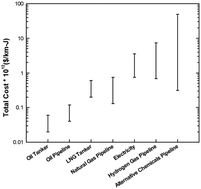当前位置:
X-MOL 学术
›
Energy Environ. Sci.
›
论文详情
Our official English website, www.x-mol.net, welcomes your
feedback! (Note: you will need to create a separate account there.)
Relative costs of transporting electrical and chemical energy
Energy & Environmental Science ( IF 32.4 ) Pub Date : 2018-01-29 00:00:00 , DOI: 10.1039/c7ee01987d Fadl H. Saadi 1, 2, 3, 4, 5 , Nathan S. Lewis 1, 2, 3, 4, 5 , Eric W. McFarland 6, 7, 8, 9, 10
Energy & Environmental Science ( IF 32.4 ) Pub Date : 2018-01-29 00:00:00 , DOI: 10.1039/c7ee01987d Fadl H. Saadi 1, 2, 3, 4, 5 , Nathan S. Lewis 1, 2, 3, 4, 5 , Eric W. McFarland 6, 7, 8, 9, 10
Affiliation

|
Transportation costs of energy resources are important when determining the overall economics of future energy infrastructure. The majority of long distance energy transmission occurs via merchant ships and pipelines carrying oil or natural gas. In contrast, future energy scenarios often envision vastly altered energy transportation scenarios including very high degrees of grid electrification and widespread installation of hydrogen pipelines. The unit cost of energy transportation varies by over two orders of magnitude. In particular, the costs of electricity and hydrogen transmission are substantially higher than the cost of oil and natural gas transportation. If carbon pricing is to be used to incentivize alternative energy systems, these differences in costs will need to be reduced and used when making meaningful technology comparisons.
中文翻译:

运输电能和化学能的相对成本
在确定未来能源基础设施的整体经济状况时,能源的运输成本很重要。大部分长距离能量传输通过运送石油或天然气的商船和管道。相比之下,未来的能源情景通常会预想能源运输情景将发生巨大变化,包括电网高度电气化和氢气管道的广泛安装。能源运输的单位成本变化超过两个数量级。特别地,电和氢传输的成本显着高于石油和天然气运输的成本。如果将碳定价用于激励替代能源系统,则在进行有意义的技术比较时,需要减少并使用这些成本差异。
更新日期:2018-01-29
中文翻译:

运输电能和化学能的相对成本
在确定未来能源基础设施的整体经济状况时,能源的运输成本很重要。大部分长距离能量传输通过运送石油或天然气的商船和管道。相比之下,未来的能源情景通常会预想能源运输情景将发生巨大变化,包括电网高度电气化和氢气管道的广泛安装。能源运输的单位成本变化超过两个数量级。特别地,电和氢传输的成本显着高于石油和天然气运输的成本。如果将碳定价用于激励替代能源系统,则在进行有意义的技术比较时,需要减少并使用这些成本差异。











































 京公网安备 11010802027423号
京公网安备 11010802027423号